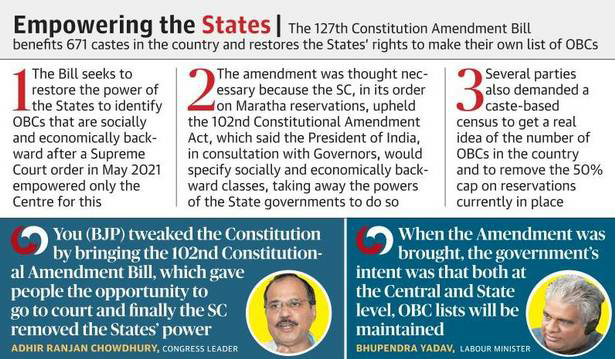[ad_1]

Context:
The Constitution (127th Amendment) Bill, 2021, was passed by the Parliament with Rajya Sabha giving its approval to the bill.
The Rajya Sabha approved the bill with the majority of the strength of the house and not less than the two-thirds majority of the members present in the house.
Lok Sabha had passed the Constitution (127th Amendment) Bill, 2021, unanimously.
The bill was passed in the Lower House of Parliament with more than two-third majority of the house strength as well as the members present in the house.
Constitutional Provisions for identification of OBCs:
- The Bill seeks to restore the power of State governments to identify OBCs that are socially and educationally backward after a Supreme Court order in May 2021 empowered only the Centre to do so.
- According to the Constitution of India, Articles 15(4), 15(5), and 16(4) confer power on a state to identify and declare the list of socially and educationally backward classes.
- As a matter of practice, separate OBC lists are drawn up by the Centre and each state concerned.
- The amendment was thought necessary because the SC, in its order on Maratha reservation, upheld the 102nd Constitutional Amendment Act.
- It inserted Articles 338B and 342 A (with two clauses) after Article 342, which said the President of India, in consultation with the Governors, would specify socially and educationally backward classes, taking away the powers of State governments to do so.
- The bill should be considered as the 105th Constitution Amendment bill after being renumbered.
- The legislation aims at restoring the power of the States and the Union Territories to make their own OBC list.
- The Central Government had introduced a key constitution amendment bill in Lok Sabha that seeks to restore the state’s power to make their own OBC lists.
About National Commission for Backward Classes (NCBC):
It is made under 102nd Constitutional Amendment Act, 2018. It had inserted Articles 338B and Article 342A (with two clauses) after Article 342.
Articles 338B deals with the structure, duties and powers of the National Commission for Backward Classes.
Article 342A says that the president, in consultation with the governor, would specify the socially and educationally backward classes.
Constitutional status to National Commission for Backward Classes:
- The NCBC is a body set up under the National Commission for Backward Classes Act, 1993.
- It has the power to examine complaints regarding inclusion or exclusion of groups within the list of backward classes, and advise the central government in this regard.
- The Bill seeks to establish the NCBC under the Constitution, and provide it the authority to examine complaints and welfare measures regarding socially and educationally backward classes.
- The NCBC will be required to present annual reports to the President on working of the safeguards for backward classes.
- These reports will be tabled in Parliament, and in the state legislative assemblies of the concerned states.
What is the procedure to get 127th Constitution Amendment Bill passed?
- An amendment of the Constitution can be initiated only by the introduction of a bill in either House of Parliament.
- The bill must then be passed in each House by a majority of the total membership of that House and by a special majority of not less than two-thirds of the members present and voting.
- In case of disagreement between the two Houses, there is no provision for a joint sitting.
- If the amendment seeks to make any change in any of the provisions mentioned in the provision to Article 368, it must be ratified by the Legislatures of not less than one-half of the states.
- Although there is no prescribed time limit for ratification, it must be completed before the amending bill is presented to the president for his assent.
127th Constitution Amendment Bill: Why is it needed?
- The latest amendment was necessitated after the Supreme Court in its Maratha reservation ruling upheld the 102nd Constitutional Amendment Act but stated that the President, based on the recommendations of the National Commission for Backward Classes (NCBC), will determine which communities will be included on the state OBC list.
- The 127th Amendment is required to restore the powers of the State Governments in order to maintain the state list of OBCs which was taken away by the Supreme Court interpretation.
- This Bill furthers social empowerment. It also reflects our Government’s commitment to ensuring dignity, opportunity and justice to the marginalised sections.
- The government also announced 27% reservation for the Other Backward Classes (OBCs) and 10% quota for the Economically Weaker Sections (EWS) in the All India Quota (AIQ) scheme for undergraduate (UG) and postgraduate (PG) medical/dental courses from 2021-22 onwards.
However, some experts said that the concept of social justice will remain incomplete till “backward and oppressed castes don’t get proportional representation in all pillars of the democracy”.
For this it is necessary that other backward castes should be identified and counted. Who can do this work other than the state government.
Conclusion:
The current Constitutional Amendment Bill is a historic legislation as 671 castes in the country would benefit from it. Therefore, benefitting nearly one-fifth of the total OBC communities.
It will restore the States’ rights to maintain a state list of OBCs which was taken away by a Supreme Court interpretation.
It will allow states to respond quickly to socio-economic requirements which are specific to a state or region.
India has a federal structure and the passed Bill will further enhance the federal structure of the country. This amendment was essential to benefit society at large.
[ad_2]

